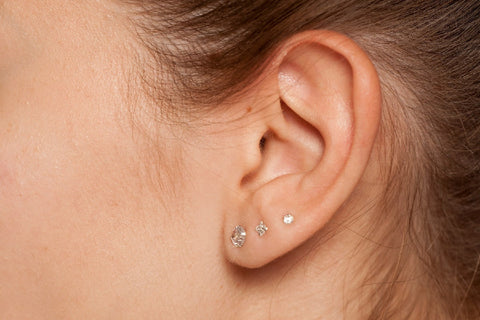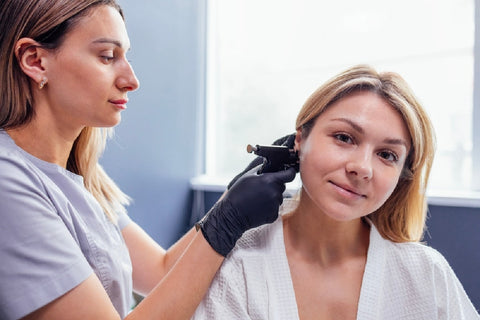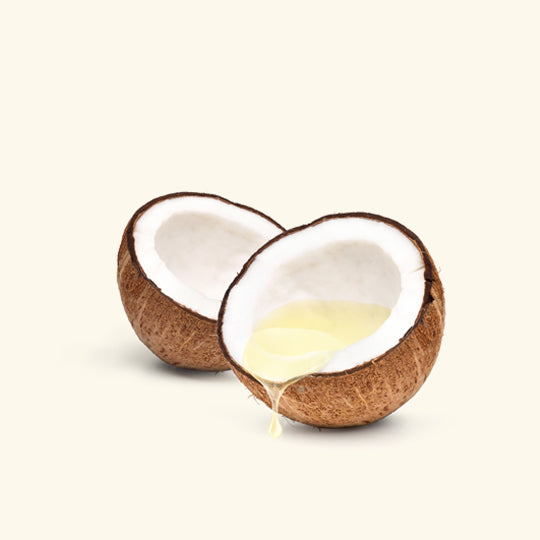Today, there are many ways to present your fashion style, but today piercings have become popular. They are a great form of self-expression, but they require proper care and maintenance to ensure a healthy and safe healing process.

While many products in the market have recently helped with the healing process of piercings, coconut oil has gained immense popularity for its potential benefits. Yes, you read that right. There are many benefits of coconut oil for the piercing healing process and preventing infections. If you still need convincing, let's explore coconut oil's benefits for piercings.
Is Coconut Oil Good For Piercing?
The answer is yes; coconut oil is good for piercing and can be trusted by individuals to speed up the healing process and prevent any infections from the piercings, too. Despite being debated for years, it has been happily chosen today as an aftercare oil for piercing.

As it is a natural product derived from the meat of the coconut, it is rich in fatty acids, vitamins and minerals that help protect all types of piercings. However, its effectiveness varies among individuals and piercing types, especially in the case of fresh or infected piercings.
Coconut Oil Benefits for Piercings
Now that you know coconut oil benefits piercings, you may wonder how. This section will answer your question with a list of virgin coconut oil benefits for piercings of different types. Let's dive in and understand its benefits.
- New Piercings: Coconut oil is rich in anti-microbial properties that help protect against possible infections and promote quick healing for new piercings. It has a gentle moisturising effect that soothes the area and reduces possible pain.
- Infected Piercings: Despite its antibacterial properties, coconut oil may not be enough to treat infected piercings alone. You must seek professional care; however, the antibacterial properties of coconut oil may provide further help.

- Belly Piercings: Belly piercings are complicated to treat because of their thick skin. Coconut oil, which has a thicker consistency, will help treat and prevent any possible belly piercing infections. It may not be the best option for belly piercings, but it is a considerable option.
- Fresh Piercings: The moisturising characteristics of coconut oil may help newly pierced areas by avoiding extreme dryness and promoting a more seamless healing process. Nonetheless, one should consider personal sensitivities and the piercing before using.
How To Use Coconut Oil For Piercings?
Now that we know the benefits of coconut oil for piercings of different types, let's jump to how you can use it to reap its maximum benefits.
It is very easy to apply like any other oil, but when combined with another potent ingredient, you can maximise its benefits. So, we have shared an easy DIY recipe that can help you use coconut oil for piercings in the best possible way.
Tea Tree Oil And Coconut Oil For Piercings
Combining tea tree oil and coconut oil for piercings can give you an amazing amalgamation of natural care. So, here's how you can use the two oils together for piercings.

Tea tree oil offers anti-microbial properties, and coconut oil offers moisturising effects; utilising both oil properties can help protect the piercings from any possible infection.
Ingredients:
- Virgin Coconut Oil - 1 Teaspoon
- Tea Tree Essential Oil - 2 Drops
Directions:
Step 1: Combine a small amount of tea tree oil with coconut oil in the mentioned quantities.
Step 2: Apply a tiny amount of mixture to the area of skin near the piercings and leave it there.
Step 3: Use this mixture once a day for a week. Monitor the piercing for any signs of improvement or adverse reactions.
Frequently Asked Questions
For clarification about coconut oil for piercings, refer to our Frequently Asked Questions section. We have answered the most asked questions.

Q: Can I Put Coconut Oil On My Eyebrow Piercing?
Ans: Yes, coconut oil is highly recommended during the first two months of your eyebrow piercing. The oil contains natural anti-microbial and anti-inflammatory properties that help reduce inflammation and redness around the piercing.
Q: Can I Put Coconut Oil On My Nose Piercing Bump?
Ans: Coconut oil can be applied on a nose-piercing bump after conducting a patch test to check for adverse reactions. If it doesn't irritate, gently apply a small amount to the bump using a clean cotton swab.
Q: Can We Apply Coconut Oil After Ear Piercing?
Ans: After an ear piercing, applying coconut oil sparingly can offer moisturisation and aid healing. Conduct a patch test first to ensure no adverse reactions.
Q: What Does Coconut Oil Do For Piercings?
Ans: Because of its moisturising and antibacterial qualities, coconut oil may benefit piercings. Applying it sparingly can help keep the piercing region moist, promoting healing and avoiding extreme dryness.

Q: Can I Use Coconut Oil On Piercing?
Ans: You can use coconut oil for piercings as it is rich in moisturising and anti-microbial properties. However, Conduct a patch test first, and if it doesn't irritate, apply sparingly to the piercing to keep the area hydrated.
Q: Is Coconut Oil Bad For Piercings?
Ans: No, coconut oil is not bad for piercings. It is a great oil to help speed up the healing process post-piercing.
Conclusion
In conclusion, coconut oil is a great option to protect piercings and prevent further infections. With potential benefits like moisturisation and anti-microbial properties, coconut oil has become a great option to help with piercing problems. If the infection or pain persists, seek assistance from a doctor or medical professional.











 Sign in
Sign in Register now
Register now My Reward Points
My Reward Points









